新版八下英语Unit1知识点
英语八年级下册unit1知识点

英语八年级下册unit1知识点英语学习是需要掌握一定的知识点才能更好地理解和运用语言。
本文将介绍英语八年级下册Unit1的重点内容,帮助学生更好地复习学习。
一、动词不定式动词不定式是动词的一种形式,通常由“to”和动词原形共同构成,用途广泛,并且常与其他词语搭配使用。
例如:We like to play basketball.(我们喜欢打篮球。
)He wants to go to the movie theater.(他想要去电影院。
)动词不定式具有动词的特点,可以表示动作或状态,也可以作为名词、形容词或副词的补充,需要灵活运用。
二、情态动词情态动词是一类特殊的助动词,表示说话者的态度、想法、推测、建议等。
英语八年级下册Unit1中常见的情态动词有“can、could、may、might、must、shall、should、will”等。
例如:I can speak English very well.(我能非常好地说英语。
)She should study more.(她应该再多学习一些。
)情态动词的用法比较复杂,需要结合具体语境进行理解,语法规则也有一定的复杂性,需要多加练习。
三、被动语态被动语态是表达主语受到动作影响的动词形式,通常由“be+过去分词”构成,用于强调动作的承受者,常与“by”连用。
例如:The book was written by him.(这本书是他写的。
)The flowers were watered by the girl.(这些花是那个女孩浇的水。
)被动语态在英语表达中应用广泛,需要掌握其构成、用法及注意事项,以便在交际中恰当地运用。
四、形容词与副词比较级和最高级形容词和副词的比较级和最高级形式用于比较不同事物之间的差异和程度等级。
其中,一般情况下,单音节形容词和副词的比较级和最高级结尾加“-er”和“-est”,双音节或多音节形容词和副词则在前面加“more”或“most”。
新目标英语八年级下册Unit1Willpeoplehaverobots知识点
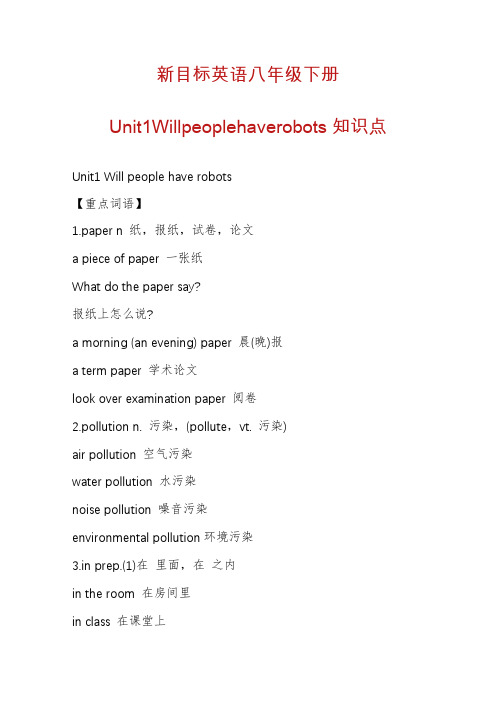
新目标英语八年级下册Unit1Willpeoplehaverobots知识点Unit1 Will people have robots【重点词语】1.paper n 纸,报纸,试卷,论文a piece of paper 一张纸What do the paper say?报纸上怎么说?a morning (an evening) paper 晨(晚)报a term paper 学术论文look over examination paper 阅卷2.pollution n. 污染,(pollute,vt. 污染)air pollution 空气污染water pollution 水污染noise pollution 噪音污染environmental pollution环境污染3.in prep.(1)在里面,在之内in the room 在房间里in class 在课堂上(2)在(某段时间)之间in the morning 在早上in the past 在过去I′ll come back in a day or two我过一两天就会回来in,after,later 接时间段,都可表示“(一段时间)之后”,它们有什么区别呢?①“in+一段时间”指“(将来的)一段时间之后”。
What will you be in five years?五年之后你干什么?We’ll start off in ten minutes.我们十分钟后出发。
②“after+一段时间”或“一段时间+later”表示“(在过去某个时间看来)一段时间之后”。
He went home after two days.他两天后回家了。
Three years later,she had a baby.三年后,她生了一个婴儿。
4.less adj. 较少的;少量的(little的比较级)They buy less beer and fewer cigarettes now现在他们买的啤酒和香烟比以前少了。
八下英语语法归纳

八下英语语法归纳Prepared on 21 November 2021新版八年级英语下册第一单元知识点归纳Unit 1 What’s the matter一、基础知识1. What’ s the matter 怎么啦出什么事情了【解析】matter/ ' mt(r)) /n.问题;事情What’ s the matter with you= What’s the trouble with you = What’ s wrong with you 你怎么了【注】: matter 和trouble 为名词,其前可加the 或形容词性物主代词,wrong 是adj. 不能加the【用法】用于询问某人有什么病或某人遇到什么麻烦、问题其后跟询问对象时,与介词with连用。
即:What’s the matter with sb. = What’s your trouble = What’s up = What happens to sb.—What’s the matter with you —I have a bad cold.2. I had a cold.我感冒了。
have a cold=catch a cold=have theflu感冒have a fever 发烧 have a cough咳嗽 have a stomachache胃疼,肚子疼 have a toothache牙疼 have a headache头疼3. 身体部位+ache(疼痛)构成新的复合词stomach+ache=stomachache head+ache=headachetooth+ache=toothache back+ache=backache后背痛4. much too+ 形容词,意为太...... ,too much+名词,意为很多,大量。
5. enough【形容、副词】足够的/地,enough放在名前后,形副后。
八下英语unit1知识点总结

八下Unit1知识点总结一、Comic strip∽Reading 考点:★★★重点短语:搬走move away 等候… wait for… 出生be born 打牌play cards 从那时起since then 发生take place 结婚get married 下象棋play Chinese chess一个钢铁厂a steel factory在这几年间over the years非常了解某物know sth very well惊人的变化the amazing changes把某物变成某物turn sth into sth把某物放进某物里put sth into sth意识到这个问题realize the problem像以前一样经常as often as before采取行动去改善这种情况take action to improve the situation★★★重要用法:1、曾经做某事used to do sth.被用来做某事be used to do sth.习惯于做某事be/get used to doing sth.2、....得多much+比较级3、与某人分享某物share sth with sb4、对某人友好be kind/nice/friendly to sb5、采取行动做某事take action to do sth6、做某事是怎样的I t’s + 形容词+ to do sth7、a bit + 形容词感觉有点孤独feel a bit lonely8、lonely 孤独的,寂寞的,偏僻的alone 单独,独自9、“乘坐某种交通工具” :by + 交通工具(放句末)take + a/the + 交通工具(放句中)骑自行车:by bike=ride a bike步行去学校:walk to school=go to school on foot步行回家:walk home=go home on foot【注意:( home , here , there ) 这3个地点副词前,不加to 】10、花费时间做某事take+时间+to do sth;spend+时间+doing sth= spend+时间+on sth 11、in some ways 在某种程度上;在某些方面in this way 用这种方法in one’s way 挡某人的路on one’s way to…在某人去…的路上by the way 顺便说一下;顺便问一下二、Grammar 语法考点:【现在完成时态】1、概念:①:过去开始发生的动作或存在的状况一直延续到现在例句:They have waited for more than two hours.他们等了两个多小时。
八年级下英语第一单元知识点总结
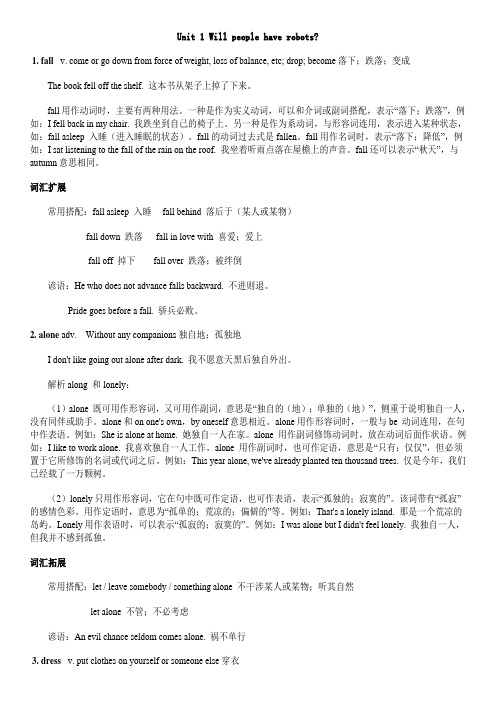
Unit 1 Will people have robots?1. fall v. come or go down from force of weight, loss of balance, etc; drop; become 落下;跌落;变成The book fell off the shelf. 这本书从架子上掉了下来。
fall用作动词时,主要有两种用法。
一种是作为实义动词,可以和介词或副词搭配,表示“落下;跌落”,例如:I fell back in my chair. 我跌坐到自己的椅子上。
另一种是作为系动词,与形容词连用,表示进入某种状态,如:fall asleep 入睡(进入睡眠的状态)。
fall的动词过去式是fallen。
fall用作名词时,表示“落下;降低”,例如:I sat listening to the fall of the rain on the roof. 我坐着听雨点落在屋檐上的声音。
fall还可以表示“秋天”,与autumn意思相同。
词汇扩展常用搭配:fall asleep 入睡fall behind 落后于(某人或某物)fall down 跌落fall in love with 喜爱;爱上fall off 掉下fall over 跌落;被绊倒谚语:He who does not advance falls backward. 不进则退。
Pride goes before a fall. 骄兵必败。
2. alone adv. Without any companions 独自地;孤独地I don't like going out alone after dark. 我不愿意天黑后独自外出。
解析along 和lonely:(1)alone 既可用作形容词,又可用作副词,意思是“独自的(地);单独的(地)”,侧重于说明独自一人,没有同伴或助手。
alone和on one's own,by oneself意思相近。
八年级英语下册第一单元知识点汇总

Unit 1 What’s the matter?词句精讲精练词汇精讲1. have a coldhave a cold是动词短语,意为“患感冒,伤风”,也可以说成catch a cold/get a cold或take a cold。
其中have表示“患病,得病”,不能用于进行时态,但可与一段时间连用,表示状态;而catch/geta cold则表示瞬时动作,不能同一段时间连用。
例如:I have had a cold for three days. 我感冒三天了。
此句也可以表达为:I had/caught/got a cold three days ago.【拓展】表示人体某部位“痛”时的几种结构:(1)have a + 身体部位名词后加-ache构成。
例如:have a headache 头痛have a toothache 牙痛have a stomachache胃痛(2)have a sore + 身体部位名词。
例如:have a sore throat 喉咙痛have a sore arm 胳膊痛have a sore foot 脚痛(3)身体部位+ hurt/ache。
例如:My eyes hurt. 我眼睛痛。
My legs ache. 我腿疼。
(4)have a pain in/ on + the + 身体部位。
例如:I have a pain in the arm. 我胳膊痛。
(5)There is something wrong with + one’s + 身体部位。
例如:There is something wrong with your eyes. 你的眼睛有毛病。
2. rest(1)rest作及物动词,意为“使休息”,作不及物动词,意为“休息”。
例如:You should rest your eyes after a lot of reading.在大量阅读之后,你应该休息一下你的眼睛。
八年级英语下册 Unit 1 What’s the matter知识点总结、作文 (新版)人教新目标
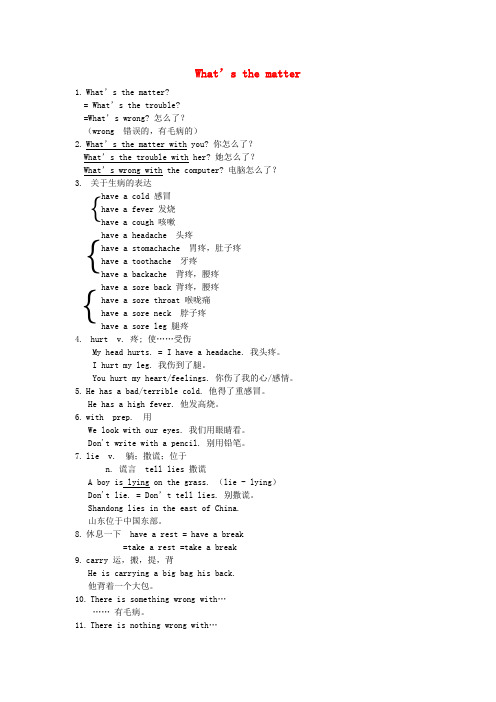
What’s the matter1.What’s the matter?= What’s the trouble?=What’s wrong? 怎么了?(wrong 错误的,有毛病的)2.What’s the matter with you? 你怎么了?What’s the trouble with her? 她怎么了?What’s wrong with the computer? 电脑怎么了?感冒发烧咳嗽头疼胃疼,肚子疼牙疼背疼,腰疼背疼,腰疼喉咙痛脖子疼腿疼疼; 使……受伤My head hurts. = I have a headache. 我头疼。
I hurt my leg. 我伤到了腿。
You hurt my heart/feelings. 你伤了我的心/感情。
5.He has a bad/terrible cold. 他得了重感冒。
He has a high fever. 他发高烧。
6.with prep. 用We look with our eyes. 我们用眼睛看。
Don't write with a pencil. 别用铅笔。
7.lie v. 躺;撒谎;位于n. 谎言 tell lies 撒谎A boy is lying on the grass. (lie - lying)Don't lie. = Don’t tell lies. 别撒谎。
Shandong lies in the east of China.山东位于中国东部。
8.休息一下 have a rest = have a break=take a rest =take a break9.carry 运,搬,提,背He is carrying a big bag his back.他背着一个大包。
10.There is something wrong with………有毛病。
11.There is nothing wrong with………没毛病。
英语八年级下册m1知识点

英语八年级下册m1知识点英语八年级下册M1是说英语八年级下册的第一模块,这个模块主要是讲述了一些重要的知识点,在这里我们来一一了解一下。
一、动词时态动词时态是英语语言中非常重要的一部分,我们必须掌握好它。
动词时态包括:现在时、过去时和将来时。
现在时表示现在正在发生的事情,过去时表示已经发生了的事情,将来时表示将要发生的事情。
二、被动语态被动语态是一个非常常用的语法形式,它用于表示动作的承受者。
例如:这本书被我借走了。
在这个句子中,“这本书”是承受者,“我”是动作的执行者。
三、宾语从句宾语从句是一个包含在宾语中的子句,它常常作为主句的宾语。
例如:我知道他在做什么。
在这个句子中,“他在做什么”是宾语从句。
四、状语从句状语从句是一个包含在句子中的子句,它通常用来修饰句子中的动词,形容词或者副词。
例如:当我见到他时,他正在做功课。
在这个句子中,“当我见到他时”是状语从句。
五、比较级和最高级比较级和最高级是英语中用来比较两个或多个事物差异的基本形式。
比较级表示两个事物之间的大小或者差异,最高级用来表示三个或多个事物之间的大小或者差异。
六、情态动词情态动词是一组特殊的助动词,它们与其它动词搭配使用,用来表达肯定、否定、建议、请求、可能性、能力等。
例如:我可以帮助你。
在这个句子中,“可以”就是一个情态动词。
以上就是英语八年级下册M1的知识点总结。
我们如果掌握了这些语法规则,就能更好地学习英语,更好地理解和应用英语。
人教版新版八年级英语下册Unit1 知识要点
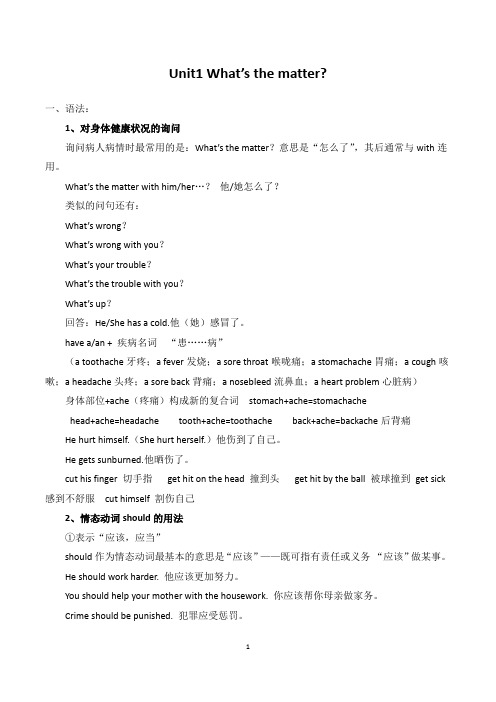
Unit1 What’s the matter?一、语法:1、对身体健康状况的询问询问病人病情时最常用的是:What’s the matter?意思是“怎么了”,其后通常与with连用。
What’s the matter with him/her…?他/她怎么了?类似的问句还有:What’s wrong?What’s wrong with you?What’s your trouble?What’s the trouble with you?What’s up?回答:He/She has a cold.他(她)感冒了。
have a/an + 疾病名词“患……病”(a toothache牙疼;a fever发烧;a sore throat喉咙痛;a stomachache胃痛;a cough咳嗽;a headache头疼;a sore back背痛;a nosebleed流鼻血;a heart problem心脏病)身体部位+ache(疼痛)构成新的复合词stomach+ache=stomachachehead+ache=headache tooth+ache=toothache back+ache=backache后背痛He hurt himself.(She hurt herself.)他伤到了自己。
He gets sunburned.他晒伤了。
cut his finger 切手指get hit on the head 撞到头get hit by the ball 被球撞到get sick 感到不舒服cut himself 割伤自己2、情态动词should的用法①表示“应该,应当”should作为情态动词最基本的意思是“应该”——既可指有责任或义务“应该”做某事。
He should work harder. 他应该更加努力。
You should help your mother with the housework. 你应该帮你母亲做家务。
最新新版人教版 英语 八年级下unit 1-10短语翻译和词形资料讲解

一、短语和句子翻译1.感冒2.胃痛3.发烧4.躺下5.休息6.令某人惊讶的是…7.right away8.get into trouble 9.be used to doing10.be used to do ed to do 12.冒险13.run out of= 14.get out of15.be in coutrol of 16.放弃17.感到恶心18.照X光19.put a bandage on it20.what’s wrong?= =21.我妹妹和我得了咽喉痛。
22.我应该怎么办?23.她昨天讲的太多而且没有喝足够的水。
24.--我应该敷点药在上面吗?--不,不用。
25.他应该量体温。
二、词形转换1.foot(复)___________2.tooth(复)_____________3. head→头疼4.stomach→胃痛5.we→反身代词______________6.climb→n._______7.knife(复)___________8.death→adj_________→v.________9.importance→n.___________ 10. decision→v.unit 2.一、短语和句子翻译1.打扫干净2.振奋起来;鼓励3.give out=e up with5.推迟6.给某人打电话7.care for 8.参加…选拔9.自愿做…10.赠送11修理12.长得像…13 set up14.make a difference 15.put up16.养老院17. 感到孤独18.在…岁的时19.at the same time 20.would like to do1.我长得像我爸爸2.我想要帮助无家可归的人。
3.小明相信这个能帮他得到他理想的工作。
4.我感到非常幸运的拥有了这条狗。
二、词形变化1.train.v.→n.2.own v.→n.3.difficult. adj→n4.kind adj→n.5.interest v. →adj一、短语和句子翻译1.take out the rubbish2.反复;频繁3.一…就…4.做家务5. in order to6.depend on7.take care of8.do the dishes9.make one’s bed10.fold one’s clothes 11.扫地12.clean the living room 13.没问题14.get a ride 15. at least →反16.any minute 17.be always doing 18.mind doing 19.have a test 20.invite sb to a party21.hang out with sb. 22.as a result23.spend time on sth24--我可以和我的朋友外出就餐吗?--好的,没问题。
Unit1what’sthematter_SectionA知识点梳理人教版八年级英语下册

人教版八年级下册英语课本知识点梳理Unit 1 wh at’s the matter? sectionA课文内容:What's the matter? 怎么了? (教材第1页)【用法详解】What's the matter? 怎么了?/出什么事了?常用于询问某人患了何种疾病,遇到了什么困难等,也可用于询问某物出了什么故障,其后可接with sb./sth.,表示“某人/某物怎么了?”。
其中matter 用作名词,意为“问题;事情”matter前须加定冠词the。
【例句】What's the matter? 怎么了?Bad luck.I lost my pen. 真倒霉,我弄丢了钢笔.What's the matter with him? 他怎么了?He has a sore back.他背痛【拓展】matter[动词] 要紧;有关系多用在否定句、疑问句或条件句中It doesn't matter.没关系。
(通常用来回答对方的道歉)I have a cold. 我感冒了。
(教材第1页)【用法详解】have a cold (患)感冒。
其中have 用作及物动词,意为“患(病);遭受(病痛)”,常用于结构“have a/an +疾病名称”表示患病或身体某部位不舒服。
此时它不能用于进行时态,其第三人称单数形式为has,过去式为had。
常见的表示病痛的短语还有:have a fever 发烧have a toothache 牙疼have a headache头痛have a cough 咳嗽have a stomachache胃痛Do you often have a cold? 你经常感冒吗?Jim had a stomachache after supper yesterday.吉姆昨天晚饭后胃痛。
l have a stomachache.我胃痛。
( 教材第1 页)【用法详解】stomachache [名词]胃痛;腹痛是由“名词stomach(;腹部)+ache(疼痛)”构成的复合名词。
(完整版)Unit1人教版八年级英语下册语法与知识点,推荐文档

Unit 1第一部分:Grammar一、情态动词(Modal Verbs)情态动词should 意为“应该,应当”,必须和后面的动词原形一起构成谓语,没有人称和数的变化。
用以表达职责和义务、提出劝告,而且表述的是自己的主观看法。
注意:should 在以why,who,how 等疑问词开头的问句中,意为“竟然,居然,怎么会”,表示意外、惊喜或在说话人看来是不可思议的。
三、反身代词表示反射或强调的代词叫做反身代词。
反身代词是由第一人称、第二人称形容词性物主代词或第三人称代词的宾格形式,词尾加self 或selves 组成。
反身代词可译“本人”、“本身”,为加强语气,也常翻译为“亲自”、“自己”。
不定人称代词one ---- o neself.第二部分:单词用法Section A1.What’s the matter?怎么了?该句常用询问某人患了何种疾病或遇到了什么麻烦,其后用with 引出对象。
1). What’s the matter with sb.?=what’s wrong with sb.?=what’s the trouble/problem with sb.?=what’s one’s trouble/problem?e.g. What’s the matter w ith Tom?=what’s with Tom?=What’s the with Tom?=What’s Tom’s?2). matter, 名词,“问题,事情”e.g. We have important (matter) to discuss.我们有些重要的问题要讨论。
3). 动词,“要紧,关系重大”e.g. It dosen’t that you came late.2.I have a cold. 我感冒了。
1).have/get/catch a cold “感冒,着凉”The old man a cold yesterday.那位老人昨天感冒了。
新目标英语八年级下unit1知识点总结(问答疾病,状从、宾从)

重点短语1.have a sore back / throat 背部/咽喉疼痛2.have / catch a cold =have the flu 感冒;得了流感3.have a (high)fever 发(高)烧4.have a toothache 牙痛5.have a headache 头疼6.have a stomachache 胃疼;肚子疼7.talk too much谈的太多;too much+不可数名词8.drink enough water喝足够的水;big enough足够大9.lie down and rest 躺下来休息10.take one’s temperature 给某人量体温11.see a dentist and get an X-ray看牙医并做X光透视12.cut oneself 切伤自己;cut off 切除cut it/them off13.put some medicine on it在上面敷些药14.drink some hot tea with honey喝些带蜂蜜的热茶15.take breaks away from 远离……而休息片刻16.see an old man lying on the side of the road看见一位老人正躺在路边(lie)17.shout for help呼救;shout at 向……喊;shout to 嚷18.stop the bus without thinking不假思索地停下车19.get off 下车;get on 上车;get it /them on (off)20.to one’s surprise 使某人惊奇的是21.take sb to sp 带某人去某地22.wait for 等候……can’t wait to do sth 迫不及待地干什么23.agree to do sth同意干什么24.think about oneself为自己考虑think about saving a life考虑挽救一个生命25.hurt oneself doing sth在干某事中伤害自己26.fall down 跌倒;fall off 从……摔下27.have problems doing sth在干某事中有困难have problems breathing呼吸困难28.get sunburned 晒伤29.be interested in 在……感兴趣30.be used to doing sth 习惯于干某事;be used to taking risks31.lose one’s life because of accidents由于事故而丧生32.run out 用完;用光run out of 把……用完33.be ready to do sth愿意迅速做某事get ready for 为……做准备34.so that = in order to do sth 目的干什么35. a book called (call)……一本名叫……的书36.mean being in a difficult situation 意思是在困难的境况下37.get out of 离开;从……出来;下小汽车—get into上小汽车38.tell of the importance of making good decisions 告诉有关做出好决定的重要性的情况39.be in control of 掌管;管理40.keep on doing sth 一直,坚持干某事41.make a decision to do sth.下决心干某事42.Thanks to +名词或代词多亏;幸亏(多放在句首)43.expect sb to do期望某人干什么44.in time 及时;on time 准时at times 有时45.hit sb on the head/ nose ; hit sb in the face.(硬的用on;软的用in)打了某人的头,鼻子;打了某人的脸46.hurt oneself doing sth.在干某事中伤了自己hurt yourself playing soccer 踢足球中伤了自己重点句型1.问毛病:①What’s the matter (with) …?怎么啦?②What’s the trouble (with) …?③What’s wrong with …?④What happened?⑤Is there anything wrong with…?⑥Are you OK?2.回答+建议①I have a cold. You should drink lots of water and rest.②I have a cough and sore throat. You should hot tea with honey.③I have a sore back. You should lie down and rest.④I have a fever. You should take your temperature.⑤I have a toothache. You should see a dentist and get an X-ray.⑥I have a stomachache. You should lie down and rest.You should eat less meat and take more exercise.⑦I cut myself. You should put some medicine on it and put a bandage on it .⑧No, I don’t feel well./ I feel… / I have a … Should I …?You should… / You shouldn’t …3.I think I sat in the same way for too long without moving.我认为我以同样的方式坐了太久而没有运动。
八年级英语下册知识点

八年级英语下册知识点Unit 1 what’s the matter?一、重点短语词组1. have a fever 发烧2. have a cough 咳嗽3. have a toothache 牙疼4. talk too much 说得太多5. drink enough water 喝足够的水6. have a cold 受凉;感冒7. have a stomachache 胃疼8. have a sore back 背疼9. have a sore throat 喉咙痛10. lie down and rest 躺下来休息11. hot tea with honey 加蜂蜜的热茶12. see a dentist 看牙医13. get an X-ray 拍X 光片14. take one’s temperature 量体温15. balanced diet平衡饮食16. go along…沿着……走17. take breaks 休息18. sound like 听起来像19. all weekend 整个周末20. in the same way 以同样的方式21. on the side of the road 在马路边22. shout for help 大声呼救23. without thinking twice 没有多想24. get off 下车get on 上车25. have a heart problem 有心脏病26. to one’s surprise 使.......惊讶的27. thanks to 多亏了;由于28. in time 及时29. save a life 挽救生命30. get into trouble 造成麻烦31. agree to do sth. 同意做什么32. because of 由于33. get out of 离开;从……出去34. hurt oneself 受伤35. put a bandage on sth.用绷带包扎36. fall down 摔倒37. feel sick 感到恶心38. have a nosebleed 流鼻血39. cut his knee 割伤他的膝盖40. put her head down 把她的头低下41. have problems breathing 呼吸困难42. mountain climbing 登山运动43. be used to doing sth. 习惯做某事44. take risks 冒险45. so that 为了46. So… that 如此……以至于…47. be in control of 掌管;管理48. in a difficult situation 在困境中49. keep on doing sth. 继续或坚持做某事 50. make a decision 做出决定51. stay healthy 保持健康=keep healthy=keep in good health=keep fit52. put some medicine on sth. 在…上面敷药二、重点句型1. What’s the matter?你怎么了?= What’s the trouble / problem with you?= What’s wrong with you?2. What should she do? 她该怎么办呢?Should I take my temperature? 我应该量一下体温吗?主语+ should/shouldn’t + 动词原形...①You should lie down and rest. 你应该躺下休息一会儿。
(完整版)人教版八年级英语下册Unit1知识点讲解(可编辑修改word版)

Unit 1 重点知识讲解Grammar一、情态动词(Modal Verbs)情态动词should 意为“应该,应当”,必须和后面的动词原形一起构成谓语,没有人称和数的变化。
用以表达职责和义务、提出劝告,而且表述的是自己的主观看法。
1.should 的句式结构2.s hould 的用法喜或在说话人看来是不可思议的。
二、其他表示建议的句型表示反射或强调的代词叫做反身代词。
反身代词是由第一人称、第二人称形容词性物主代词或第三人称代词的宾格形式,词尾加self 或selves 组成。
反身代词可译“本人”、“本身”,为加强语气,也常翻译为“亲自”、“自己”。
不定人称代词one ---- oneself.1、反身代词的分类2、反身代词的用法单词的用法Section A1.What’s the matter?怎么了?该句常用询问某人患了何种疾病或遇到了什么麻烦,其后用with 引出对象。
1). What’s the matter with sb.?=what’s wrong with sb.?=what’s the trouble/problem with sb.?=what’s one’s trouble/problem?e.g. What’s the matter with Tom?=what’s with Tom?=What’s the with Tom?=What’s Tom’s?2). matter, 名词,“问题,事情”e.g. We have important (matter) to discuss.我们有些重要的问题要讨论。
3). 动词,“要紧,关系重大”e.g. It dosen’t that you came late.2.I have a cold.我感冒了。
1).have/get/catch a cold “感冒,着凉”The old man a cold yesterday.那位老人昨天感冒了。
8下英语第一单元英语知识点
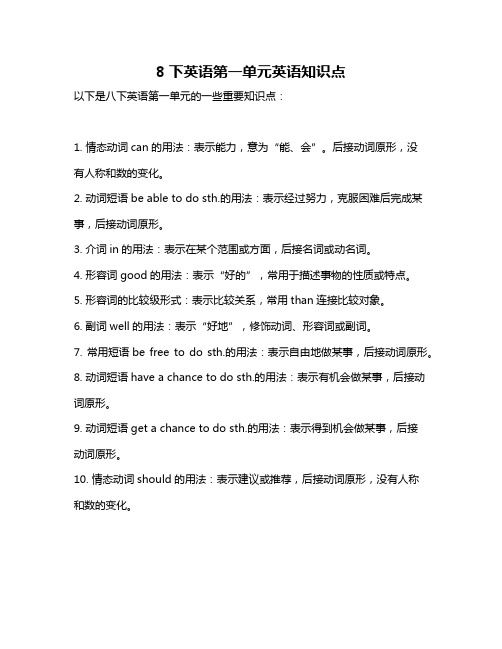
8下英语第一单元英语知识点
以下是八下英语第一单元的一些重要知识点:
1. 情态动词can的用法:表示能力,意为“能、会”。
后接动词原形,没
有人称和数的变化。
2. 动词短语be able to do sth.的用法:表示经过努力,克服困难后完成某事,后接动词原形。
3. 介词in的用法:表示在某个范围或方面,后接名词或动名词。
4. 形容词good的用法:表示“好的”,常用于描述事物的性质或特点。
5. 形容词的比较级形式:表示比较关系,常用than连接比较对象。
6. 副词well的用法:表示“好地”,修饰动词、形容词或副词。
7. 常用短语be free to do sth.的用法:表示自由地做某事,后接动词原形。
8. 动词短语have a chance to do sth.的用法:表示有机会做某事,后接动词原形。
9. 动词短语get a chance to do sth.的用法:表示得到机会做某事,后接
动词原形。
10. 情态动词should的用法:表示建议或推荐,后接动词原形,没有人称
和数的变化。
以上是八下英语第一单元的一些重要知识点,通过熟练掌握这些知识点,有助于提高英语语言能力。
- 1、下载文档前请自行甄别文档内容的完整性,平台不提供额外的编辑、内容补充、找答案等附加服务。
- 2、"仅部分预览"的文档,不可在线预览部分如存在完整性等问题,可反馈申请退款(可完整预览的文档不适用该条件!)。
- 3、如文档侵犯您的权益,请联系客服反馈,我们会尽快为您处理(人工客服工作时间:9:00-18:30)。
新版八下英语知识点
Unit1 What’s the matter?
1.cut off, 切除, 2get out of从…出来, 11.tell of讲述, 3 be in control of掌管,管理, 4have a nosebleed流鼻血,5get sunburned 晒伤,
get into trouble陷入麻烦, 6fall down摔倒,7.see a dentist看牙医, 8.right away 立刻,马上,9.be interested in对…感兴趣, 10.take risks/ take a risk冒险,11. lose one’s life,丧生,lose—lost, 12.be ready to do准备干某事,
句子,
13.To his surprise, they all agreed to go with him.
14Thanks to the passengers, the man was saved by the doctors in time. 15 As a mountain climber, he is used to taking risks. 16He bandaged himself so that he would not lose too much blood.为了不至于失血过多,他给自己缠好绷带。
17 He almost lost his life because of accidents.他差点因为意外丢掉性命.
18.He kept on climbing mountains even after this experience.甚至在这次经历后他继续登山。
19.What’s the matter with you?
20.He has a very sore throat.
21.The driver saw an old man lying on the side of the road.
22. I think you should lie down and rest.。
